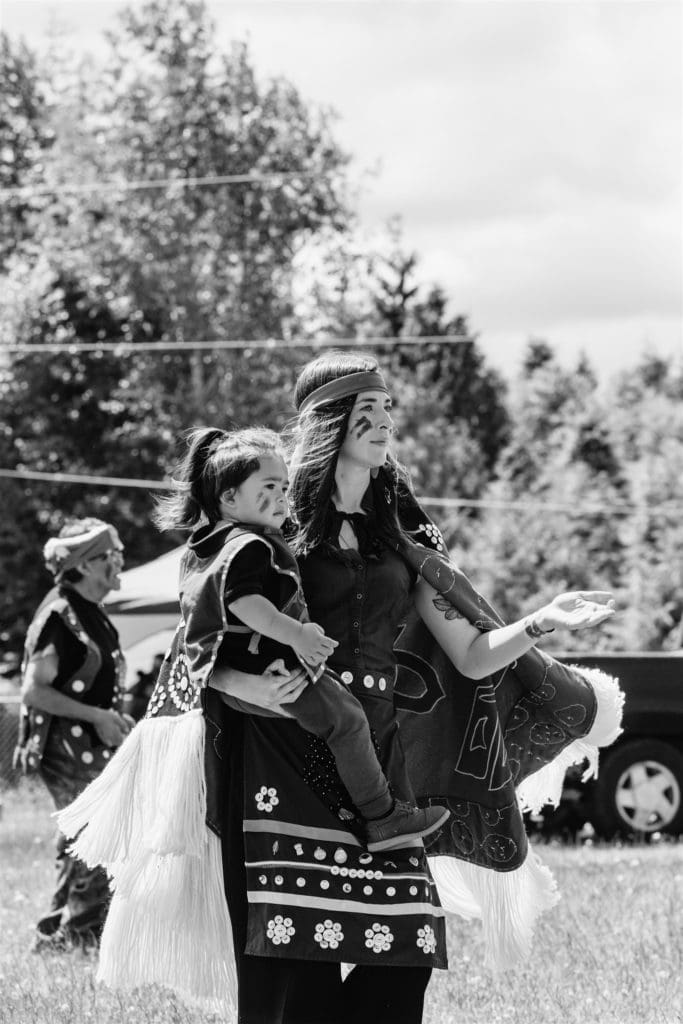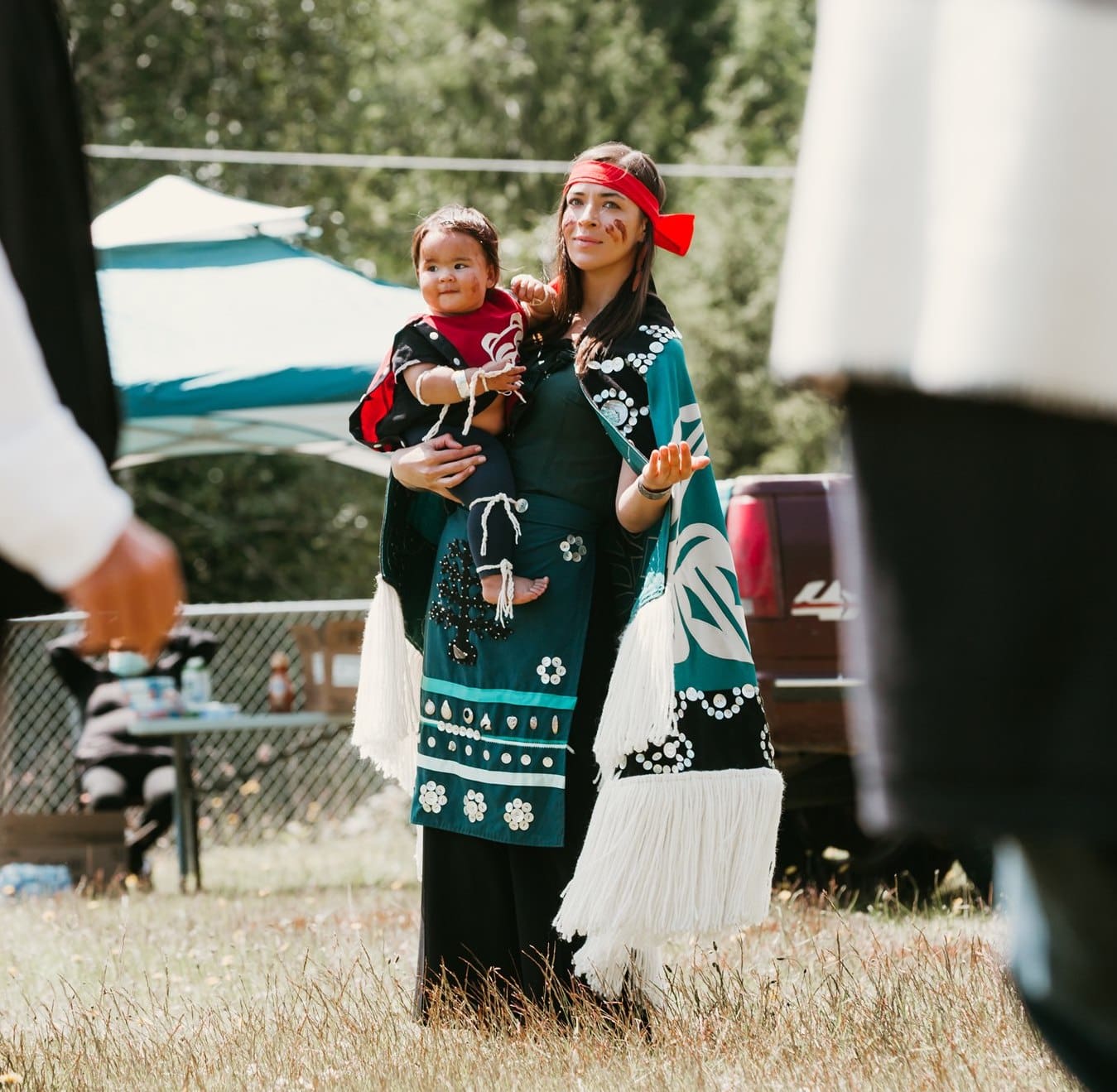Our featured Canadian influencer this month is Max̌muwidzumǧa, Lucy Hemphill, whose October pick in VITA is a proud, local Indigenous brand! Read all about Lucy below, and watch for more fabulous influencer insights in the coming months! —Vita Daily

Hi Lucy! Please tell us a bit about yourself to start.
I’m Kwakwaka’wakw from the Gwa’sala-‘Nakwaxda’xw Nation, and I also have Metis ancestry from the Red River region in Manitoba and am also Scottish and Irish. I’m the mom of a magic little boy named Aliwas. I grew up in the Gwa’sala-‘Nakwaxda’xw community of Tsulquate, and am very rooted to my Kwakwaka’wakw culture and Identity. To me, this means traditional Kwakwaka’wakw foods and medicines harvesting and preparing as well as Kwakwaka’wakw ceremony and culture are all important aspects of my life. I am also very connected to my family and community. I’m learning to speak our ancestral language- Kwak’wala, and am working to develop a Language Immersion program in our community. I am also a founding member of the Kwakwaka’wakw Doula collective and work to support new moms through providing traditional medicines and foods. I’ve worked to support healing in my community in various capacities for the past 10 years. I am also a story-teller, and have a few published written-works.
How do you use your platform to impact those who follow you?
I share my story. Indigenous people all over the world share a lot of similarities. We are deeply rooted to the lands and waterways and to our cultures and communities. And in all our beautiful and diverse ways, our ancestors, and now us, are incredibly resilient to have held on to all of that in the face of colonialism, forced assimilation and genocide. Yet, each one of us have different experiences to share. For example. I grew up immersed in my culture and community and I identify as Kwakwaka’wakw, yet I have Metis, Irish and Scottish heritage as well, my eyes are green and my skin is fair. I experience the world a lot differently than my aunts and uncles and cousins and other close relatives, because I have white privilege. There is magic in my stories, in the work I do, and the ancestral strength that I carry. So, I share my story, and a lot of people learn about the horrors that have happened to Indigenous people in Canada and still happen today. And they learn about our resilience and strength. But because I can only share my lived experience, I also amplify the stories of other Indigenous and BIPOC folks, and movements. Because my story is just one perspective, and to get a better understanding of what’s going on you need to listen to the stories and voices and lived experiences of other folks who are oppressed by an unjust system.
How do you remain a voice for and active within your Indigenous community?
Ninety-nine per cent of the work I do is not visible to the world through my social media. And that’s okay, because I’m working for my community, for our people, for my son and for our future generations. First and foremost, I’m a Kwakwaka’wakw mom. So, I need to ensure my son is deeply connected to his Kwakwaka’wakw Identity. I also work as a Doula and support our local midwife by providing plant medicines and traditional foods for Kwakwaka’wakw moms and I bring them out on the land to harvest their own medicines for their post-partum recovery. In that way I’m helping to revitalize traditional birth practices and ensure our babies come into this world in a good way. I support my community’s food security by growing food in our community garden as well as maintaining traditional food harvesting and preparation practices. I am also learning my ancestral language, kwak’wala, which is considered to be critically endangered, since the only ones who speak it fluently are Elders. So, I’m working with a team of people to develop a kwak’wala immersion program. Revitalizing our language is a vital step in our collective healing, because our unique worldview really can’t be defined or articulated through the English language. Moreover, our language was literally beaten out of our parents, grandparents and great grandparents in residential school. So, reclaiming our language is critical component of reclaiming our Kwakwaka’wakw Identity and wellbeing.
What is your advice for those of us who are not part of the local Indigenous community, but wish to gain more knowledge/understanding and be allies?
Research, research, research. Right now you can take a free online course through the University of Alberta to learn more about Indigenous people across Canada, and the history (and present reality) of colonization in this country. Follow and amplify diverse indigenous voices through social media. Support Indigenous artists, storytellers and businesses. Buy our books, watch our films, I guarantee these will be enlightening and enriching experiences.
Reconciliation is a word that gets a lot of press. What does it mean to you, and what do you think Canadians can do to advance it/get involved in the movement?
To be honest, it’s not a word that carries a lot of weight for Indigenous folks. Because Indigenous communities are still experiencing oppression and forced assimilation. Indigenous people who are attempting to protect their traditional territories are criminalized and experience violence for doing so. An example is the Wet’suwe’ten, who were protecting their sacred sites from a being torn up to place a pipeline through. I’m also thinking of the disgusting amount of violence and racism the Mi’kmaq faced by Canadians when they launched their moderate livelihood fishery in Nova Scotia. They have a right to do so, they are doing it sustainably, they are doing it in their traditional territories, and they are doing it in accordance with their traditional laws as well as a Supreme Court of Canada Ruling (the 1999 Marshall decision). I’m also thinking of the horribly disproportionate numbers of missing and murdered Indigenous women, including Nuuchahnulth woman Chantelle Moore, who was murdered in her home by a police officer who was conducting a “wellness check.” This is just a fraction of what is happening right now, not in the past. Go look at the comments section of any news story involving Indigenous folks, and you will see the blatantly ignorant and violent racism Indigenous people face daily. Reconciliation as a word, carries no weight. But reconciliation as an action rooted in respect and a desire to do better, does. Some actions you can do are, find out whose traditional territory you are on. Most of British Columbia is Unceded Indigenous territories. Learn about whose territory you’re benefitting from. Learn how to properly say their name. Learn how you can support their healing and resurgence, such as donating to Indigenous organizations who are directly supporting Indigenous healing and resurgence in your area. Learn about and support Indigenous folks who are protecting their territories from extractive industry. This is just a very small list of some of the things you can do to put action behind the word “reconciliation.” Most importantly, have compassion and respect. The intergenerational trauma and resulting barriers and racism that SO many Indigenous folks face is overwhelming. Learn how to overcome inherent prejudices and see Indigenous folks as people deserving of respect, regardless of their financial or social status. Unlearn the historical amnesia many Canadians have inherited. Unlearn and disrupt the racist stories that get taken up by society and retold over and over again about Indigenous people. We do not get everything for free. We are not exempt from paying taxes. We don’t get to go to university for free. We are fighting hard to heal from the mountain of trauma we carry because of living in a society that values us and our cultures as “less-than.” That same society worked hard for over a hundred years to destroy our spirits, our cultures, and our territories. In spite of all of that, we are still here, and our roots are still strong.
What’s your personal style/beauty mantra?
I’m not gonna lie, I look and feel the best when I’m out on the land or sea with my loved ones, harvesting foods and medicines, and when I’m wearing my regalia during ceremony. So I guess it would have to be: Connect. Get outside. Deepen your roots. Remember where you come from. And do what makes your feel alive. Also, put Ooligan grease on everything, ha ha!
What’s your top Indigenous product pick?
I really love everything Skwalwen Botanicals. Skwalwen is a botanical skincare company owned by Leigh Joseph, a lovely and brilliant Squamish Ethnobotanist who incorporates ancestral knowledge in a really respectful way into the work she does. I am deeply aware of my relationship to anything I put in or on my body, so it makes me really happy to be able to use products that I know came from a good place and were harvested in a good way. My favorite products are the Kalkay wild rose toner and the Kw’enikway poplar whipped body butter.
Follow Lucy on Instagram. Photo by Kimberley Kufaas Photography.

Be the first to comment